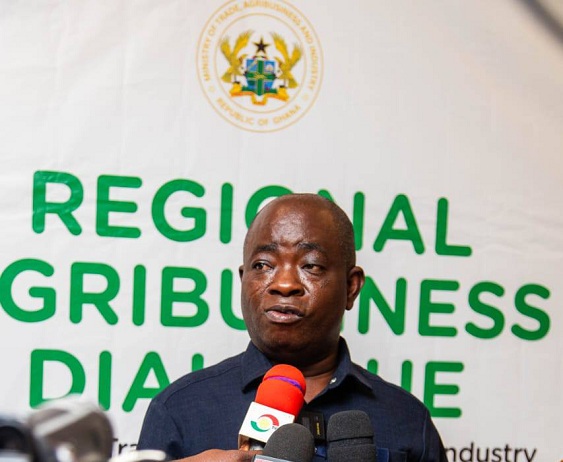The Deputy Minister for Trade, Agribusiness and Industry, Sampson Ahi, has announced that government will, in the short term, waive taxes on agro-processing machinery to boost investment and productivity in Ghana’s agribusiness sector.
Speaking on behalf of the sector Minister at the Regional Agribusiness Dialogue held on Monday, October 13, 2025, in Sunyani, Sampson Ahi said the initiative forms part of a two-pronged strategy by government to promote agro-industrialisation and ensure machinery sufficiency within the sector.
According to him, the decision to waive taxes will reduce costs for agro-processors, increase access to modern machinery and technology, and enhance efficiency across the value chain.“In the medium to long term, government will retool and strengthen local machinery manufacturing, working closely with institutions such as GRATIS Foundation under the Rural Enterprises Programme of the Ministry, with support from the International Fund for Agricultural Development (IFAD),” he added.
The Deputy Minister noted that this retooling effort will position local manufacturers to design, produce, and repair agro-processing machines, thereby reducing dependence on imports and promoting local content. He emphasised that such interventions would not only drive productivity but also create jobs and stimulate innovation within the machinery manufacturing sector.
Touching on broader policy directions, Hon. Ahi revealed that the Ministry of Trade, Agribusiness and Industry is developing a comprehensive National Agribusiness Policy aimed at improving value addition, productivity, export competitiveness, and job creation within the sector.
“The policy focuses on the entire value chain—from production to consumption—ensuring sustainability, inclusivity, and growth. These regional consultations are crucial to identify region-specific priorities that will be incorporated into the draft policy,” he explained.
The Deputy Minister said the government’s realignment of the Ministry of Trade and Industry to the Ministry of Trade, Agribusiness and Industry reflects its strong commitment to transforming Ghana’s agricultural potential into industrial growth. The inclusion of Agribusiness, he said, was deliberate—intended to drive value addition and extension across agricultural value chains to boost national income and competitiveness.
Sampson Ahi also underscored the importance of the consultation theme, “Resetting Agribusiness for Inclusive and Sustainable Industrial Growth,” describing it as both timely and vital to Ghana’s economic transformation agenda.
He observed that many industries in Ghana operate below 40 percent capacity, mainly due to limited access to raw materials. Strengthening agricultural value chains and developing local supply systems, he said, is essential to achieving a sustainable 24-hour industrial economy.
“As we seek to transform Ghana’s agribusiness sector, our focus must be on improving competitiveness and efficiency to drive industry growth and job creation,” he urged.
Highlighting specific government interventions, Hon. Ahi mentioned the Feed the Industry Programme, Rapid Industrialisation Programme, and Accelerated Export Development Programme as major initiatives driving Ghana’s 24-hour economy aspiration.
The Feed the Industry Programme, he said, seeks to ensure consistent supply of quality raw materials to factories, increase industrial capacity utilisation from 30–40% to 70–80%, and establish robust supply chains linking smallholder and commercial farmers to processors.
The programme, he explained, is built on four pillars—commercial farmer development, post-harvest infrastructure, industrial linkages and market development, and strong institutional management through a dedicated Programme Implementation Unit within the Ministry.
Mr. Ahi further called for collaboration among stakeholders, noting that government alone cannot achieve the desired transformation. “We must work together to maximise the sector’s potential and ensure that growth benefits are shared equitably among all stakeholders,” he said.
He concluded by urging participants to use the dialogue as a platform to identify and contribute region-specific priorities for inclusion in the forthcoming Agribusiness Policy. “If we work together, we can reset our economy, drive sustainable growth, and make Ghana a leader in agribusiness—creating jobs, boosting exports, and securing a brighter future for our nation,” he said.
In welcome remarks, the Bono Regional Minister, Hon. Joseph Addae Akwaboa, called on stakeholders to work together to position Ghana as a hub for agribusiness and trade in the sub-region.
The Deputy CEO of Agri Impact Limited, Madam Juliana Asante Dartey, urged participants to provide the necessary input into agribusiness policy formulation and other future policies. This, she said, will go a long way to reflect sector-specific needs and help transform lives while changing the dynamics of agribusiness in Ghana.





